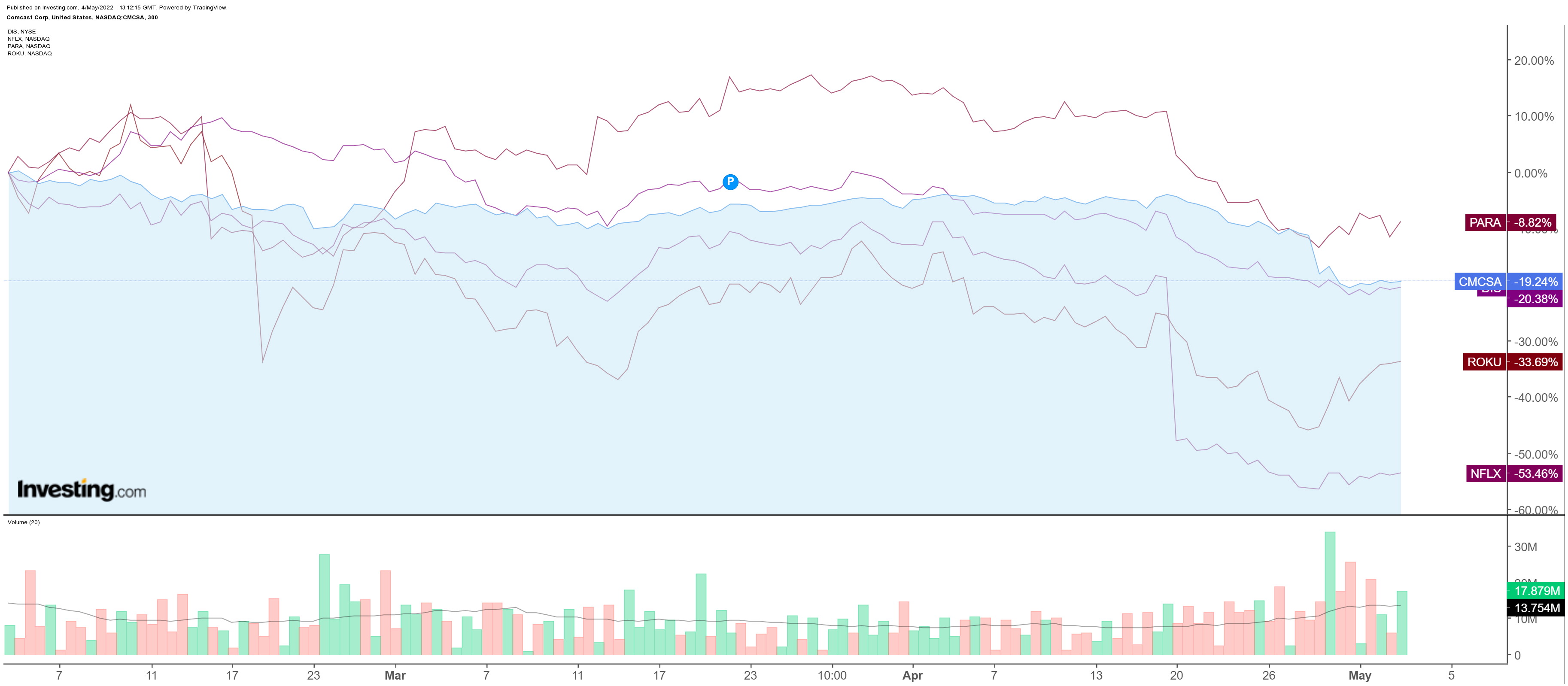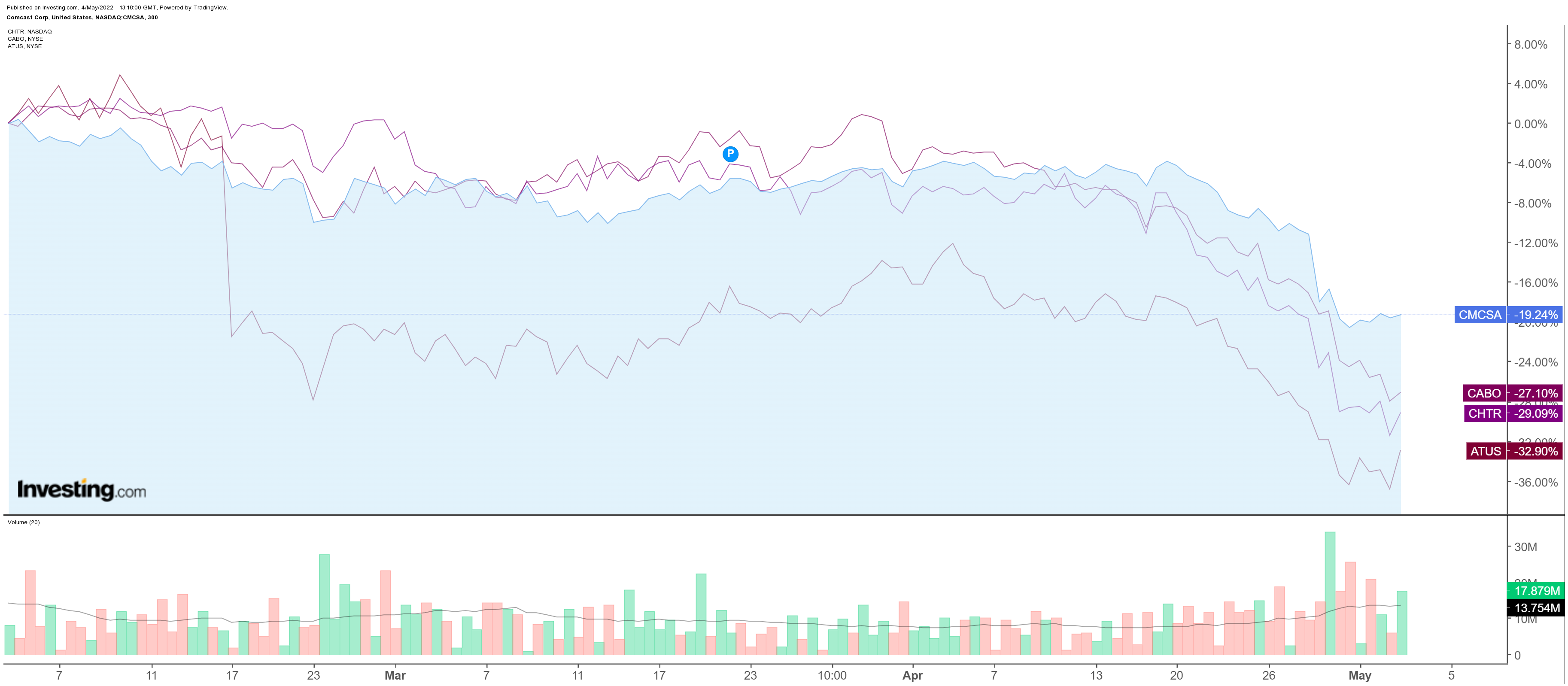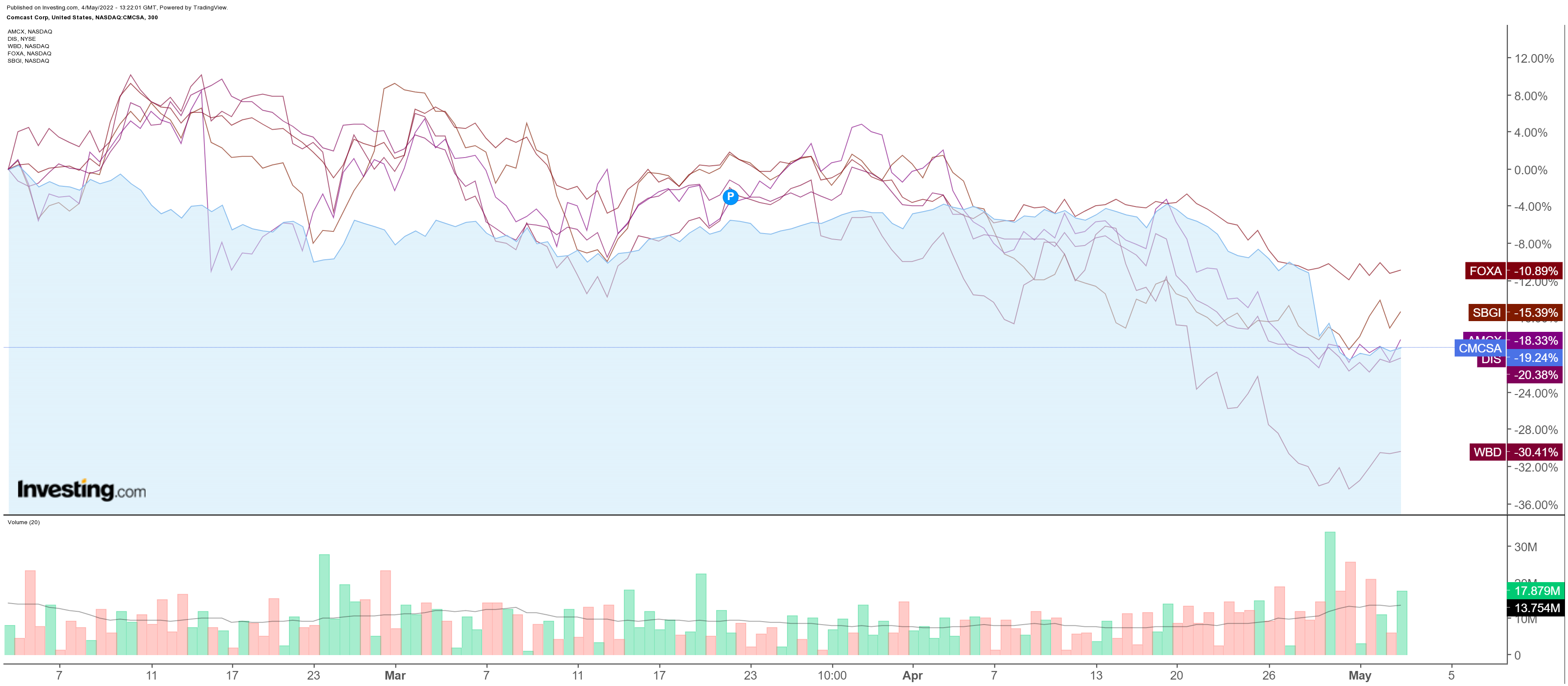It's not an exaggeration to say that, right now, Comcast (NASDAQ:CMCSA) stock is everything that investors don't like. Even relative to a steep market sell-off over the past few weeks, the sectors in which Comcast operates have been absolutely hammered.
This now is a stock that, somewhat incredibly by mega-cap standards, has lost more than a third of its value in less than eight months. Just in 10 trading sessions, $35 billion has been erased from the Comcast market cap.
It's a huge and surprising move. And it seems like an opportunity, with a long-successful company now available for a far cheaper price amid negative market sentiment.
Yes, a forward earnings multiple of about 10x seems far too cheap. In fact, it's a multiple that suggests the company's growth is over. That's kind of the point, however: it's not terribly difficult to look at Comcast right now and believe that indeed, growth is set to stall out.
Comcast Stock Gets Hit From All Directions
It's been a quadruple whammy for Comcast stock over the past few weeks. Sentiment toward each of the company's primary end markets has taken a hit.
Investors have dramatically lowered their expectations for profits from streaming in large part due to the big revenue miss from Netflix (NASDAQ:NFLX) last month. Streaming stocks have sold off as a result:

Source: Investing.com
Theme park stocks have been hit by macroeconomic concerns, though SeaWorld Entertainment (NYSE:SEAS) has managed to buck the trend.
But the declines here make some sense. There are legitimate reasons for concern across Comcast's businesses.

Source: Investing.com
The steepest and most surprising sell-off has been among broadband providers. Inflation ostensibly will put a lid on consumer spending, and limit price hikes in the industry. Meanwhile, the likes of AT&T (NYSE:T) and WideOpenWest (NYSE:WOW) are rapidly building out fiber networks, adding more competition and pricing pressure. And so a sector that's been a winner for years has been one of the biggest losers of the past few weeks:

Source: Investing.com
Finally, television network stocks were struggling even before this sell-off. Comcast certainly fits in that bucket as well. NBCUniversal's media business drove about 12% of Comcast's EBITDA (earnings before interest, taxes, depreciation and amortization) last year, according to figures from the company's Form 10-K. Amid macro concerns, an already-depressed sector has sold off further:

Source: Investing.com
To be sure, market sentiment no doubt is a factor in all four of these charts. But nearly every one of Comcast's peers is down at least 15% over the past month. And, for the most part, these are not stocks that often decline that far, that fast. In fact, historically these stocks—Comcast included—typically outperformed a falling broad market. That's not what is happening now: the S&P 500 is down only 9% over this same period, while CMCSA has fallen almost 20%.
Broadband Threat to Comcast Stock
But that underperformance comes from the market reacting to real changes in all of the Comcast businesses.
Comcast Cable, referred to in financial statements as the cable communications segment, is the core driver for Comcast stock. In 2021, it accounted for roughly 80% of the company's profit. Its importance has risen in recent years as cable profits have grown, while NBCUniversal and the theme park business have shrunk.
Looking backward, the importance of cable seems like absolutely a good thing. From 2018 to 2021, cable communications' EBITDA increased 30%. And so the simple case for CMCSA stock at the lows is that 80% of the business has increased profits at a compounded annual growth of 9%—yet the stock is priced for essentially zero growth going forward.
But, again, that growth may well be set to come to an end. Every U.S. consumer is aware of the impressive pricing power cable operators have had in recent years. The internet has become essentially a necessity, and in many markets Comcast's competition has been limited to lower-quality alternatives like DSL.
That is changing. Wireless companies are offering 5G data plans that can serve the needs of many households. Fiber “overbuilders,” like WideOpenWest, are looking to take share. Fiber is a huge part of AT&T's growth strategy going forward.
What has made cable such a great business is that incremental profit margins are high. With broadband infrastructure already built, it costs Comcast little to serve an extra business or household. It costs essentially nothing to raise prices on existing subscribers.
But when subscribers decline, or pricing turns negative, the effect reverses. Comcast loses almost every dollar of price it gives back, and substantial profit for each customer that defects. Video (i.e., cable service) and voice customers already are declining. If broadband customers do the same, the importance of broadband means that total Comcast profits are going to fall.
Investors are worried that's precisely what will happen. As one Wall Street analyst put it last month, “There is simply too much capital chasing the nation's fixed and wireless broadband customers.”
Can The Rest Of The Business Hold Up?
There are worries in the rest of the business as well. The theme park business—centered around Universal Studios locations worldwide—should continue to bounce back as post-pandemic normalcy returns. But theme parks simply aren't that big; even in 2019, that segment accounted for less than 8% of total profit. The same issue holds for the movie studio business, which drove roughly 2% of pre-pandemic earnings.
Television profits are set for a long, steady decline; earnings excluding losses at Peacock dropped nearly 8% year-over-year in the first quarter. Comcast clearly badly overpaid in its acquisition of UK-based Sky. At about 6% of total profit, Sky isn't moving the needle.
The Peacock streaming service in theory could move the stock. Even after the plunge in its share price, Netflix still is worth around $100 billion. A successful Peacock, thus, could garner a valuation that would account for a chunk of Comcast's ~$180-billion equity value.
But Peacock seems to be lagging somewhat. Churn is high. Net subscriber growth of 180,000 in the first quarter seems solid, but hardly spectacular. And while over time, Peacock will add to Comcast's earnings, the profit growth in streaming will, to at least some degree, be offset by continuing erosion at the legacy television networks. At the very least, if the cable business stagnates, there's not enough elsewhere to compensate.
The Case For Comcast Stock
Despite all this negativity, Comcast stock obviously isn't a short. And owning this business at 10x forward earnings certainly isn't the worst investment in the market. It's possible that competition fears are overblown—wireless broadband, in particular, has real limitations in terms of bandwith and service area.
But buying CMCSA simply because it's fallen so sharply since September, and since April, seems potentially dangerous. There are reasons why the month-long decline in Comcast stock has been more than double that of the broad market. It's not because panicked investors are selling indiscriminately. Rather, it's because the Comcast business suddenly looks very different—and far less attractive.
Investors can bet that the market is wrong—but at the very least, they need to understand why that view exists.
Disclaimer: As of this writing, Vince Martin has no positions in any securities mentioned.
Interested in finding your next great idea? InvestingPro+ gives you the chance to screen through 135K+ stocks to find the fastest growing or most undervalued stocks in the world, with professional data, tools, and insights. Learn More »
